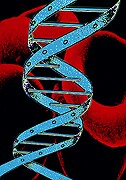
WEDNESDAY, March 10 (HealthDay News) — Children inherit fewer gene mutations from their parents than was previously thought, say U.S. researchers who are the first to sequence the entire genome of a family.
The analysis of the four family members — the parents, daughter and son — revealed that each parent passes about 30 mutations to their children. It had long been believed that each parent passes 75 gene mutations to their children.
“That’s the kind of power you get from looking at the whole genome. The mutation rate was less than half of what we’d thought,” Lynn B. Jorde, professor and chairwoman of the department of human genetics at the University of Utah School of Medicine, said in a news release from the school.
Most gene mutations passed from parents have no effect on children’s health. But it’s important to know the number of parent-to-child gene mutations.
“The mutation rate is our clock, and every time it ticks we have a new genetic variant. We need to know how fast the clock ticks,” Jorde said.
The actual rate of gene mutations each parent gives a child will vary depending on the age of the parents (particularly the father) when a child is conceived.
The study was led by the scientists at the Seattle-based Institute for Systems Biology and also included researchers from the University of Utah and the University of Washington.
The findings appear in the March 11 issue of Science Express.
More information
The U.S. National Institute of General Medical Sciences has more about human genetic variation.

